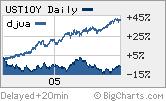 |
| Electric shock: Falling bond yields have helped make utility stocks look more attractive. |
|
|
|
|
|
|
|
|
|
| �* based on data as of 7/26/05 | | �Source:��Thomson/Baseline |
|
|
|
|
NEW YORK (CNN/Money) � Utility stocks, typically viewed as stodgy companies for conservative investors, have had high-voltage returns lately.
The 15 companies in the Dow Jones Utility Index are up an average of 17 percent this year, compared to a gain of just 1.6 percent for the S&P 500.
And the utilities are up 44 percent, on average, over the past 12 months, far outpacing the broader market's 13.6 percent gain during the same period.
What's the reason behind this power surge?
Big yields keep on turning
Fund managers say that utility companies are benefiting from a number of factors.
A relatively stable economy and oppressively hot weather across much of the country have helped fuel demand for electricity, for example.
But for the most part, there's one thing making utilities so hot: their big fat dividends. In a shaky market, stable companies with steady pay outs are seen as welcome safe havens, especially since long-term bond yields have slipped during the past year.
"Fundamentals are strong and improving for utilities but it is still the dividends attracting investors," said Tim O'Brien, manager of the Evergreen Utility and Telecommunications fund.
The average yield for the companies in the Dow Jones Utility Index is 3.1 percent. And several, including Consolidated Edison (Research), Duke Energy (Research) and Southern Company (Research) are higher than 4.2 percent.
The 10-year U.S. Treasury currently yields about 4.25 percent.
Enron schmenron
In addition to dividends and favorable macro trends, analysts cite fundamental business improvements at many utilities.
Don Hodges, manager of the Hodges fund, said the group has finally recovered from the taint of high profile collapses, most notably Enron.
In addition, many in the group are undoing missteps made in the late 1990s, when they piled on debt and tried -- unsuccessfully -- to expand into new areas. Now utilities are getting back to basics, a welcome development.
"Several utilities have been selling off outside businesses so that they are returning to being just pure utilities. Debt has been refinanced and they are generating a lot of cash, which they can use to pay bigger dividends," Hodges said.
Hodges owns several utilities in his fund, including Exelon (Research) and Xcel Energy (Research), which reported better than expected quarterly results Tuesday.
Other utility companies might be able to uh, generate, better than expected results as well.
The higher price of oil and other commodities, often a reason for concern with utility companies, does not appear to be having a negative effect on profits, said Barry James, executive vice president of James Investment Research, a mutual fund firm based in Alpha, Ohio.
"It seems like utilities have been able to pass along costs to consumers without hurting the bottom line," said James. "This should be a good earnings environment for them." His firm owns large cap utilities Exelon, Sempra Energy (Research) and Edison International (Research), as well as the smaller WPS Resources (Research), which raised its dividend last week.
In fact, some utilities may directly benefit from higher oil prices.
Southwestern Energy (Research) and Energen (Research), for example, are utilities with gas exploration operations and both reported strong increases in earnings this week.
Companies with coal and nuclear operations, such as Exelon, Entergy (Research) and FPL (Research), should also benefit from higher commodity prices. O'Brien owns all of these stocks in his fund.
The potential for more mergers in the sector may also boost stock prices.
Duke Energy announced in May that it was buying Cinergy (Research), for example. Exelon is in the process of merging with New Jersey utility Public Service Enterprise Group (Research). And O'Brien said there could be many more deals since Congress is trying to repeal a Depression-era law that restricted merger activity in the sector.
Running low on power?
Still, some question how much longer the group can continue to outperform. Utilities often don't do well in a bull market since investors favor more rapidly growing companies. That was the case in the 1990s.
Kent Mergler, president of Northstar Capital Management, a Palm Beach Gardens, Fla.-based institutional firm that typically invests in growth stocks, said he owns some utilities primarily because of their dividends. But he wouldn't buy more now because he thinks valuations are too rich.
"Utilities provide an attractive yield and the stocks have had a surprising windfall. That makes them pricey at this point," he said.
O'Brien thinks that valuations are still reasonable though. He argues that the stocks, which now trade on par with the S&P 500, deserves such multiples because earnings should grow at about the same rate as the broader market.
He said the biggest concern facing the group is not valuation but what happens with bonds -- if long-term yields continue to rise, that could draw away investor money from utilities.
But James said that despite the sector's recent run, he's not overly concerned about stocks taking a big hit as long as dividend yields remain high. He doesn't think that too many momentum investors are chasing returns in this sector.
"The steady nature of utility stocks is the reason people buy them. There are not too many people speculating about utilities," he said.
For a look at more utility stocks, click here.
For a look at what's going on with bond yields, click here.

|